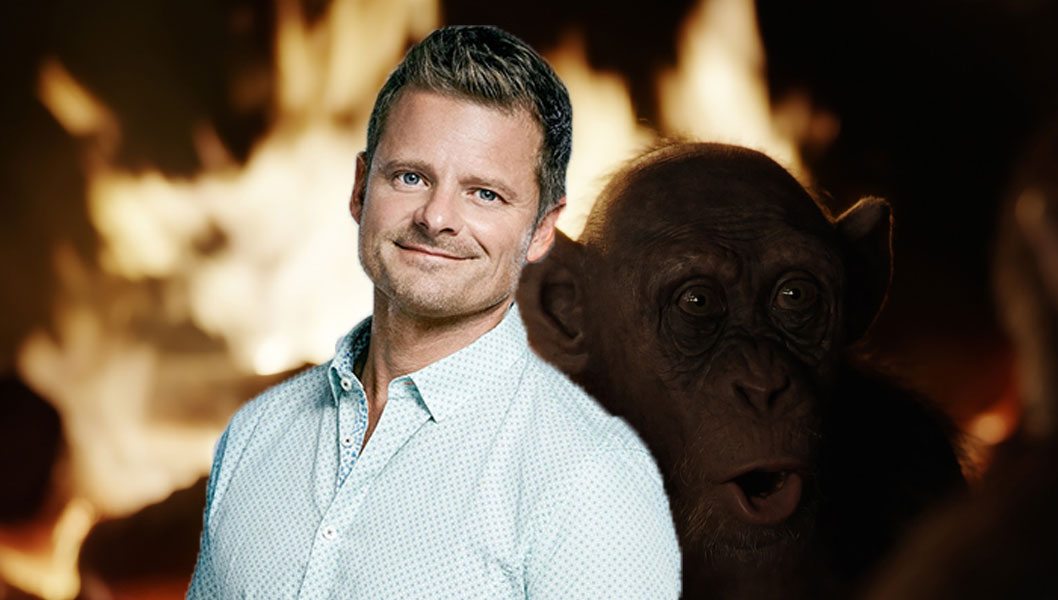Mild spoilers for War For The Planet Of The Apes lie ahead.
You may not recognise actor Steve Zahn in War For The Planet Of The Apes – clad as he is in a photo-real layer of digital paint – but his performance isn’t one you’ll forget in a hurry. He plays Bad Ape, a timid little character who, with his wide eyes and gentle voice, provides a glimmer of warmth and humour in a stark and often harsh movie.
Zahn’s enjoyed a varied and fascinating career that stretches back to the early 90s, with roles in Ben Stiller’s Reality Bites, Steven Soderbergh’s Out Of Sight and Werner Herzog’s Rescue Dawn being just a few highlights. War For The Planet Of The Apes, meanwhile, presented a new challenge for Zahn: clad in a performance-capture suit, he was tasked with playing a talking chimpanzee in freezing conditions on location in British Columbia.
The result is a wonderfully humane, spirited performance – and in person, Steve Zahn is no less of a character. So with a warning for some saucy language, here’s the Bad Apes star himself to tell us about the making of the film, how it differs from other summer movies, and his memories of working with the maverick director, Werner Herzog…
What an awesome character Bad Ape is, first of all.
Isn’t he? It’s so fun. I was just floored by this movie, the first time I saw it. I’m so proud to be a part of it.
I read in the production notes that you had a lot of input into how you built the character.
Well, the character was brilliant on the page. I was extremely excited. And the only time you could bring really good stuff to characters is if they’re already written well. It’s hard to take a character that’s two-dimensional… I mean, what do you do? Then you’re inducing things into it. But something that’s already really finely defined – that’s a little easier, especially when you start [filming].
He was that character who was always on the periphery, which, yeah, there were moments where, with Matt’s guidance, he’d be, “What would you say here? Would you do something different here?” You know. “Ehh, I don’t know. I think he’d just sit here.” [acts out the character], or, you know, “Uhh, excuse me!” [Laughs]
And Bad Ape’s so important to the film because of the direction Caesar goes in. You need someone between him and Maurice [the orangutan, played by Karin Konoval] who’s got that honesty and innocence.
Yeah, he’s the audience member, isn’t he? Going on the journey with them. “Wait, what? We’re going where? Are you nuts?” And I often play those characters, who are commenting on what’s going on, which is kind of fun.
You worked quite a lot with Terry Notary [who plays the ape Rocket, and also serves as a movement coach], I should think.
Oh my God, yeah. Terry. I texted him last night. He’s going to be in New York and I said, “Terry, any success I have, that I’m getting for this film, you’re an enormous part of that”. He’s responsible for so much of that. I mean, Terry and Andy. Terry’s kind of the coach, with all the stunt guys and everything. We’re always checking with Terry. “Is that good? Was that good?” And he’d be, “No. Here’s what you’re doing wrong.”
He’s so honest, and such a brilliant mover, such a physical guy, and a great actor, too. He was incredible to work with. My first two weeks with him… I kind of missed the ape camp, which I’m glad about, in a way. I was bummed that I missed it because I was working [elsewhere], and I love stuff like that – it’s the cool thing about being in the movies is that you get to, like, learn how to be a Navy SEAL with the real guys. So I missed that, but then I got a good one-on-one with Terry for an extended period, which was essential.
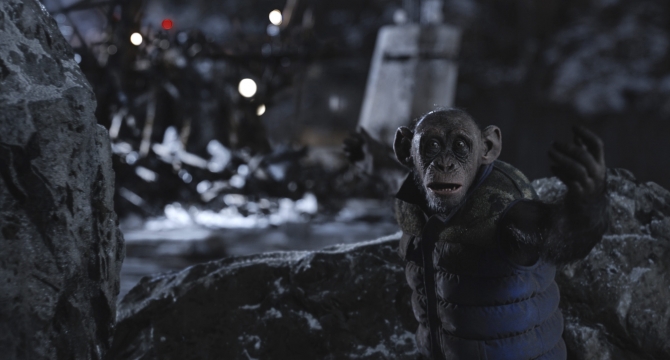
Did you have the conversation about how an ape might ride a horse?
No. It was deeper than that. And that why it was good. We weren’t preoccupied with those things. You had to embody it so that it was second nature. So you didn’t get to the point where you’re going, “How would I get off the horse as a chimp?” You train to the point where you just know it. You should do it effortlessly, you know when you touch something [as an ape] that it’s different from when we touch something. When I look over here, an ape uses its whole body. You have to get to the point where you’re, “I got it.” Which is a long process. It starts with you being retarded, but then it goes into “Oh, I kinda get it”, but then you’re thrown something and you drop it. And then you talk and all of a sudden you don’t do it. You go through this whole process, and do so many things, and think about it so much, that you just have this breakthrough. It usually comes with me working with them. I mean, you’re working with Andy Serkis, who’s got it down, trust me. And when you’re working with someone brilliant like that, it rubs off and it gets easy. Does that makes sense?
No, no, it does. It does. And I get the impression too that, in a way, it’s a liberating thing to do, because as humans we build up such a sense of self, and so much self-consciousness.
That’s interesting, because that’s basically what Terry was telling us. It’s like, we posture all the time. Whenever we’re doing anything, we posture, we hold ourselves in. Simians, their stomach sticks out.
Well, I can identify with that. [Pats belly full of the morning’s coffee and cheap sandwiches]
Well, you know, but they don’t give a shit. You know? But they’re not lazy – they’re extremely strong, so it kind of contradicts itself in our own brain. “Wait, if I’m like this” [lets shoulders sag, like an ape], how can I be like this [flexes arm muscles]? There’s a lot going on. It’s just so complicated. But to get to the point where you can embody that is fun. It’s what scared me about the job. Most of the things I go into, I’m “I’m gonna ride around with cops, and I’ll be a cop”, whatever. When I got into this and started sitting with Terry, it was like, “Breathe deep.” I realised it was different. I really have to go to work. I’m glad I’m here two and a half weeks before I start shooting, because I think I’d have a heart attack. I knew how important it was that I got this right, and how much they were relying on me to get it. The pressure, without saying anything – they’re the most beautiful group of people I’ve ever worked with – but there was pressure. That first day [whistles] – when you walk on set with people who’ve done this for years, and you’re a focal point, a big character? You’ve got to be good in that first minute. I was petrified. I couldn’t even talk.
Because Bad Ape’s such a vulnerable, open character, too, it’s the opposite of a “Hollywood Star” role, isn’t it.
Yeah. There’s something a beautiful about the guy. I knew I could play that. I didn’t concentrate on the chimp, I concentrated on solitude. Someone who’s been living on his own for two years has got to be some kind of hermit, and just so excited to be around others. Going against every instinct to be around others.
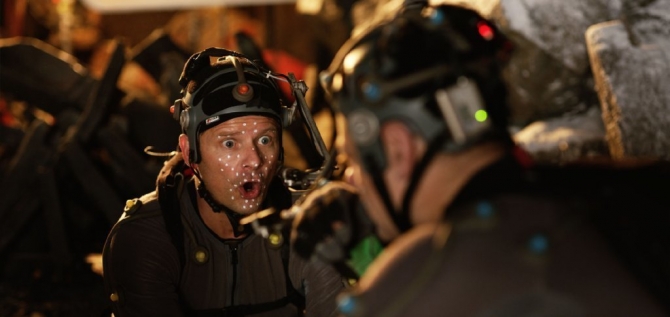
Did you draw a little bit on Rescue Dawn, I wonder?
[Laughs]
Because there are one or two parallels there.
There are! That’s very interesting. I’d never really thought of that. But yeah, there is. There’s a vulnerability to both these guys, that you just care about them in a way. I love playing weak, vulnerable, accessible characters. I like that. I would feel ridiculous playing the guy who saves the fuckin’ day with my right arm. It’s not really me at all. Nor is that interesting at all to me.
That’s what makes this film interesting, is that it isn’t about heroes and villains in any case.
No. Everyone has a lot of faults. And what makes it a great movies is that you know that, and you understand that. This is one-oh-one, man. This is 101 filmmaking. Film 101 writing. If you can show it, don’t write it. This movie? Oh my God. There’s so much said without any words. This thing moves so well, from Maurice coming out, “I can’t leave the girl.” Caesar just looks, and in the next shot they’re on the horses, and there’s that great music like a Sergio Leone western. She’s like, “Thirsty”, and Caesar’s like, “Oh fuck.” You know? [Laughs]
I said this earlier – I just thought of this. But that’s the genius of Matt [Reeves]. There wasn’t a producer saying, “Now wait a second, we have to a scene where Caesar’s okay with that. We should have a scene where Caesar says, ‘Okay, come along.'” Most people would want that, especially something this big where everything’s riding on this $200 million movie or whatever the budget was, right? But there never was that scene. We didn’t shoot that scene. If you shot that scene, you’d know it’s gonna be on the cutting room floor. But if you shot that, there’s an intention for that to be in the movie. If you take it away, it doesn’t work as well. Right? Because of the way we’re playing it. But if you don’t shoot that, we play it differently.
When you see Andy [as Caesar] next, he knows that’s the first time you see him with the girl, so he plays it completely different. That’s Matt, right? That’s balls. That’s guts, to do that. It’s the guts of the studio, it’s the guts of the director, it’s the guts of the producers, to just let the artist do their thing. Let’s slow down. I mean, there are four-minute scenes between two characters talking. It’s like you’re watching Richard III! It’s like you’re at the theatre! It’s simply shot, like Caesar and the Colonel, but it works so well. I love that scene, man.
The first scene with me – that goes on forever, when we’re next to the fire. I’m like, “We’re six minutes into meeting me and we’re still, you know, talking!” But it’s so good! And that’s why you feel something. That’s why you cry, man. I cried during this, like, fuckin’ six times! And why don’t you cry when you’re watching some big-budgeted Marvel thing? You know why? Because they don’t look like anything human. All they do is string together a bunch of moments from other movies that they think reflect a human. They put them together and they hope that you feel something. You don’t really. Well, you kind of do because the music swells and there’s slow-motion and whatever, but you don’t buy it.
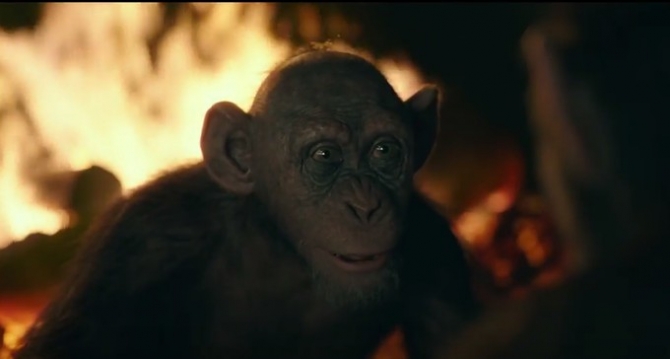
They hold you hostage, sometimes, summer movies.
Yeah, they do. And when they show the characters, like “Now we’re going to introduce the characters!” I’ve been in stuff like this, where they like, go to the office for like 14 seconds. If you time it, you’d be like [makes the click of a stopwatch.]
“Hey Charlie, you’re eating another donut.”
“Well, whatever, fuck it.”
Then I’m like, “Okay, I’m the guy who eats donuts.” I’m that guy. And that’s it. You’re the bad guy, and you’re the bad guy.
This bad guy [Woody Harrelson’s Colonel]? I totally get it. Right? You actually sympathise with this motherfucker. That takes work. That’s crafted shit, and it’s basic storytelling, which we sometimes get way, way away from, man. The people, all those audiences, are brilliant. They’re smart, man. And they know when they’re being jacked off.
[Breathes out, before laughing]
Well, Werner Herzog’s one of those filmmakers who credits his audience with intelligence. What are your memories of working with him?
There are some movies where you don’t remember one day. But I could watch [Rescue Dawn] and I could tell you every second of what was going on. He was just a brilliant dude. Mysterious. Sometimes you’d think he was completely out of his mind – not, like, crazy, he was a very thoughtful artist. We’d be like, “Does he know what he’s doing? I don’t think he knows what he’s doing.” Then the next day, it’s like, “Yeah, he knows what he’s doing, man.”
One day, he comes in and a butterfly goes past and he was just off. We were like, “There he goes. The movie’s now about a butterfly.” [Laughs]
But then you see the movie and you realise how great it was that he put that in there. Whatever, you know? And it’s minimal shooting. Not a lot of coverage. He shoots in an unorthodox way.
He uses real locations, which reminds me a bit of this film.
Yeah, it was like that, and I really enjoy that. I don’t even watch my own stuff sometimes. And not because “I don’t like watching myself” [said in thespian voice], I don’t have a problem with that. I just get bored, man. I’d rather go fish or something, you know? I’d rather sit out back and have a bourbon or feed my horses. I like being in the circus, I love going to locations. If this was all green screen, this would suck!
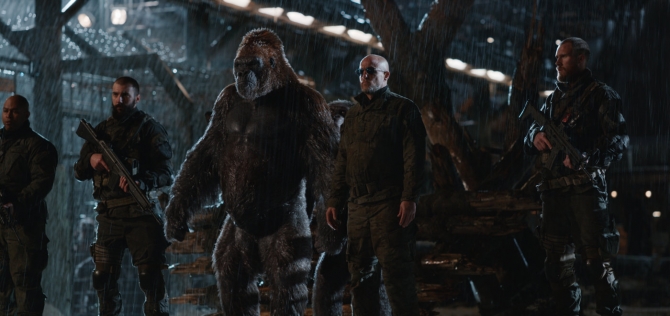
Oh God, yeah.
In this movie, if you see a river, it’s a real river. If it looks painful, it was painful. If it looks cold, it was fucking cold. We were really on horseback. You know, it was incredible to do something that was so technically credible. Motion capture is brilliant. But you know why it’s brilliant? Because it doesn’t get in the way. Because it’s made so you can do whatever you feel like doing. And Weta is so nurturing. They’re like, “How can we make you comfortable?” They’re so concerned about being in the way. Which is so great. There’s no ego there. They’re so confident, they don’t need that.
It’s in post, man – when you watch it, you’re like “Wow. That’s incredible.” But you do it, man.
Some people will say, back home, “Oh, you were in Planet Of The Apes? That’s awesome, man. That was all CGI, weren’t it?”
“What?”
“Like, CGI? You know.”
“What is that?”
“You know. Stuff.”
“You mean, you think I just did the voice-over? Fuck, man!”
For some reason, it’s not the same kind of gig all of a sudden. When people say that Andy Serkis is one of the greatest motion-capture actors, I say, “No, he’s one of the greatest actors I’ve ever worked with, motion-capture or no motion-capture.” He’s a fucking great actor, man. If he don’t get an Oscar for this performance of Caesar, I dunno. I dunno. I mean, seriously. I think it’s one for the ages, man.
You must get offered a lot of roles, but the ones you do take on are really varied. What tends to attract you to a project?
It’s story for me, and character. I don’t care about the medium – I’m doing a TV show next. It’s a great script, so cool. Small town, bodies wash up, some are dead, some are alive. Why are they here? What’s going on? They’re seeking political asylum. From where? The future. 500 years. They travel through time, and they arrive under water, where most of them drown. It’s called The Crossing. So I read that, and I thought, “Who’s doing this? It’s great!” It’s ABC. I just get attracted to that story.
I think writers have gone to TV and they’ve been given power, and we react to it. We’ve been to watch these shows that they would never have done before. And now everyone’s competing to be more inventive and imaginative and raw and funny in a different way. It’s such a great thing. I think we’re getting some quality stuff. The people in charge are facilitating artists to do their thing, you know? Everyone’s kind of understanding their role. That’s when it works best when everyone works together. Again, make it be about character. Tell a story that’s interesting. Don’t cover a scene in six sizes. Keep it in a two-shot.
Look at All The President’s Men! There’s not a close-up in that movie! And if there is, there’s a point to it. It’s all in the way we make them.
Steve Zahn, thank you very much.
War For The Planet Of The Apes is out in UK cinemas on the 11th July.

